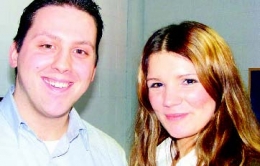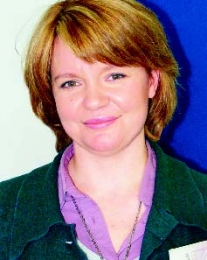Lithuanians are among a group of budding entrepreneurs who have come up with some innovative business ideas to beat the economic downturn, writes Viktor Posudnevsky
“The downturn in the economy hasn’t affected my business and I’ve plans to expand,” said Lithuanian designer AudronÄ— JomantienÄ— at the second Eastern European Business Forum in Dublin last week.
JomantienÄ— found her niche making uniforms for beauty therapists. Establishments in Ireland have different dress codes for their beauty therapists, she explained, and each tries to impress customers by having staff wear a uniform with a twist.
“A woman should look beautiful when she’s working,” said the Lithuanian, who designs elegant outfits much to the delight of male patients, she admits with a smile.
JomantienÄ— was one of around 70 entrepreneurs who attended the second Eastern European Business Forum in the capital last Saturday. One of the organisers of the event, newspaper publisher Sergey Tarutin, said: “The downturn is affecting all businesses, but I’m happy to see so many people today with great ideas.”
The main aim of the forum was to acquaint eastern European entrepreneurs with Irish Government structures which can support them. Attendees also heard presentations on financing opportunities, making a good business plan and taxation. Most in the room at DIT Aungier Street admitted that times were tough for new businesses.
“Starting your own business is always a risk,” said GunÄrs Vezauskis from Latvia. “And with the recession I probably won’t make a big profit”.
Vezauskis’ idea is to sell and install PVC stretch ceilings, which have become quite common in the Baltics, he explains, but are virtually unknown in Ireland.
“The recession will not last forever,” he added optimistically. “And when the economy picks up I’ll be already established and in a position to do good business.”
Other eastern European entrepreneurs have come up with ideas on how to beat the downturn by adapting to the new economic conditions. Janis Mlokits, also from Latvia, is about to open a car repairs shop in Co Offaly.
“Previously people could just change cars, but now they’ll have less money and they will try to keep the cars by making repairs,” he said.
Meanwhile, Martin Gaik from Poland and his Russian wife Tanya are about to open their own company dealing with web design and online marketing. Martin will leave his secure job as an IT specialist in a private college to embark on this venture.
“It’s risky,” he said. “But even in the worst of times businesses need to promote themselves online.”
Another Polish entrepreneur, Tomasz Smalec, runs an English language school in Dublin. Previously it catered exclusively for Poles, but with many of his compatriots leaving Ireland, Smalec has been persuaded to reach out to other nationalities.
“Recession is a challenge,” he noted. “It forces us to change our attitude, and that’s actually a good thing.”













